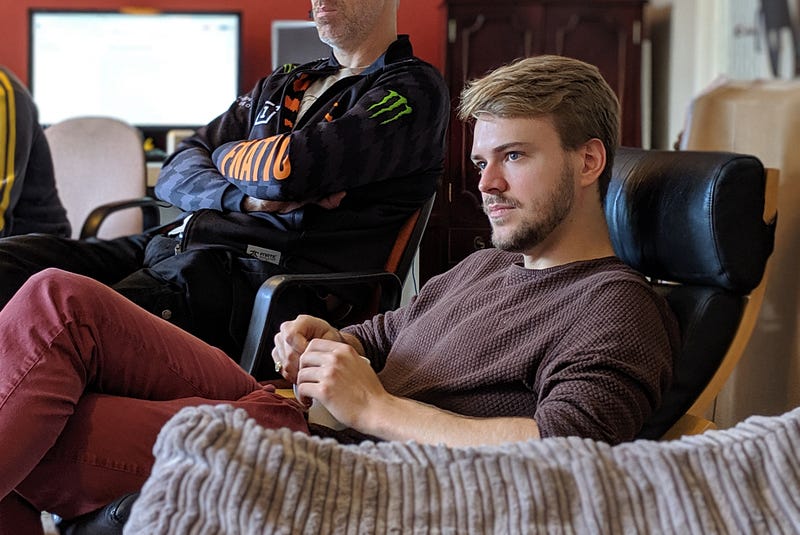Learn to listen … no, really … listen:
I learnt one concept a few years ago that changes the way I interact with people: listen to understand, don’t listen to respond. It’s way too easy to start formulating your response before the other person is done speaking. When you do that, you’re no longer fully paying attention to what the other person is saying. You can’t help someone if you don’t understand what the problem is. This principle comes from ‘active listening’.
The number one leadership initiative in any organization today is improved coaching. Coaching empowers employees, empowerment drives engagement, and engagement drives performance. At its core, coaching is about transformation. Leading distributed teams requires transforming how we coach and changing our play calls and playbooks to get things done. As a part of our interview series called “Moving From Command & Control to Coaching & Collaboration; How Leaders and Managers Can Become Better Coaches,” we had the pleasure to interview Thibaut Decré.
Thibaut is the Head of Strategy at IQM, a small UK-based company specialised in digital transformation. With a strong and diverse experience in managing innovation and business transformation across industries, Thibaut helps businesses leverage the potential of their own organisation to tackle the challenges they face. He loves helping people who are passionate about making a change in their organisation, and rather than sitting on the side-line and cheering them on, he takes a hands-on approach to get things moving.
Thank you for joining us to explore a critical inflection point in how we define leadership. Our readers would like to get to know you better. What was a defining moment that shaped who you are as a leader?
One of the most pivotal moments in my career was a short while after being promoted to my first leadership position. I had proven my worth as an individual contributor, and had earned the trust of my colleagues. I had very clear ideas on what was going wrong and had great ambitions about establishing a better communication between top management and the rest of the organisation. However, after six months of lip-service, nothing had changed. That’s when I decided to leave and prove that I could create an organisation where open communication was built into the DNA.
John C. Maxwell is credited with saying, “A leader is someone who knows the way, goes the way, and shows the way.” How do you embody that quote as a leader?
When we establish key principles in the organisation, I always make a point of applying them to myself first, and holding the rest of our leadership team equally accountable. This goes for the way we manage compensation: wage increases are handled in exactly the same way for the leadership team as for everyone else in a completely transparent way. But it also goes for when we say culture is important: we don’t de-prioritise monthly and quarterly events for the benefit of other more “urgent” matters. It’s key to show the commitment to these principles, otherwise the team will lose faith in any strategy you establish as a leader.
How do you define the differences between a leader as a manager and a leader as a coach?
A manager is someone who knows better and is there to control, a coach is there to help someone else perform their best, regardless of how competent they themselves are.
We started our conversation by noting that improved coaching is the number one leadership initiative in any organization today. What are some essential skills and competencies that leaders must have now to be better coaches?
For me, there are two key skills:
- knowing when (and how) to listen, and;
- knowing when it’s more important to learn than to succeed.
The second one might be the hardest thing to do for a leader, especially when they work in a field where they are a subject matter expert. They often would be able to do better than their team themselves. However, taking over at the slightest sign of trouble doesn’t help the organisation. It’s key to put the long-term benefit of learning over the short term gain of doing this small task perfectly.
The first one sounds logical but is quite hard in practice. When you’re trained to trust your own judgement and your job is to make decisions when other people can’t, it’s hard to switch that off to listen. I’ve personally taken part in a number of training courses and workshops that haven given me great tools for this. But even then, I’m sure I could do better.
We’re all familiar with the adage, “You catch more flies with honey than with vinegar.” How are you inspiring — rather than mandating — leaders to invest in upskilling and reskilling?
I find that focusing on what the motivation of each individual leader is, helps to identify what the benefits would be to them. Being a coaching leader saves time, stress and frustration for everyone involved. It allows everyone to spend more time on what they actually want to be doing.
In some cases, this has actually led to a decrease in responsibility of the leader concerned. Not as a ‘threat’, but because we had an open discussion about what they enjoyed doing and where they wanted to grow their career. As a result, we shifted more of the leadership responsibility to someone else in the organisation who was intrinsically motivated by the work a leader does (and not by the ‘power’.)

Let’s get more specific. How do you coach someone to do their best work? How can leaders coach for peak performance in our current context? What are your “Top 5 Ways That Leaders and Managers Can Be Effective Coaches?”
- Learn to listen … no, really … listen:
I learnt one concept a few years ago that changes the way I interact with people: listen to understand, don’t listen to respond. It’s way too easy to start formulating your response before the other person is done speaking. When you do that, you’re no longer fully paying attention to what the other person is saying. You can’t help someone if you don’t understand what the problem is. This principle comes from ‘active listening’. - Think long term:
When you see someone about to do something wrong or fail, within your team, it’s natural to have a knee-jerk reflex to step in and take over. I had a strong experience around this during a leadership retreat. We had to solve a puzzle as a team, but as time pressure increased, I ended up taking over to complete it. We accomplished the challenge. But I wasn’t there to solve puzzles, I was there to learn how to become a better leader. Next time you want to step in, think about whether the success of the task matters more than the learning experience for the team. Every time you step in as a leader, you’re fostering dependency on you rather than independence. - Establish clear expectations and boundaries:
Being a coaching leader doesn’t mean doing nothing. It’s your responsibility to set clear goals and define what success looks like. We use the GROW model for all personal development within IQM. It’s a very simple collaborative framework that allows you to establish the objectives for each individual in your team. I’ve found it to be just as helpful for your top performers as for people on a performance improvement plan. - Support yourself with tools and processes:
If ‘the system’ is forcing you down the road of management rather than coaching, it’s going to cost you energy to do the right thing. Tools should make your job easier, not harder. This is one of the first things I put in place when I joined IQM. We established a governance based on Holacracy. One of the key characteristics of Holacracy is that each team member has complete authority within their domain. This means that it’s not your job as a leader to tell people how to do their job, it’s your job to give them what they need to achieve their objectives. - Don’t be afraid to break the rules:
Being a coach is first of all being a human. I’ve worked with people who thrive on clear instructions and hate it when you wish them happy birthday, and I’ve worked with people who love to brainstorm and know how you’re feeling. We’re all continuously learning and improving, so don’t be afraid to change your approach based on tangible evidence.
We’re leading and coaching in increasingly diverse organizations. And one aspect of workforce diversity on the rise is generational diversity. What advice would you offer about how to effectively coach a multi-generational workforce? And how do you activate the collective potential of a multi-generational workforce?
Diversity is one of my favourite topics to work on. I believe that the way we work should work for every flavour of human. For a multi-generational workforce, the same applies as to any diverse workforce. Establish principles that create equality and allow enough flexibility for everyone to thrive. There is no such thing as one-size-fits-all solution, you need competent leaders that know how to adapt. The only way a leader will know how they need to adapt is if they’re receiving candid feedback early and often.
You’re referring to emotional intelligence, in a sense. What are two steps every leader can take to demonstrate a higher level of emotional intelligence?
- Accept that other people are different than you, they have different motivations, fears, ambitions and interests. You can’t expect to be able to think like all different possible humans, and you shouldn’t expect them to think like you.
- Expose yourself to humans who are very different to you, and listen to what their life is like: their struggles and joys. A very simple example that I practice regularly, is listening like this to the women in my life, talk about things they take for granted. Otherwise, I forget what their reality is like.
Words matter. And we’re collectively creating a new leadership language right now. What are the most important words for leaders to use now?
I think the most important thing is to use simple and honest words. Don’t overcomplicate things just to sound smart. We need to avoid creating a language that people who are not ‘initiated’ to won’t understand. If anything, learn about active listening, learn about GROW and learn about Holacracy.
I keep inspiring quotes on my desk. What’s your favorite “Life Lesson Quote,” and why does it mean so much to you?
“The biggest change we’ve made in the world so far, is how we run this company.”
This might not be a universally applicable quote, but it’s what our technical director said at IQM after 2 years of working together. For me, it represents the essence of my work. I sincerely hope that everyone reading this will be able to say it about their place of work at some point in the future.
Our readers often like to continue the conversation. What’s the best way for readers to connect with you and to stay current on what you’re discovering?
The best place to reach me is on LinkedIn. Everyone is welcome to connect with me there and continue the conversation.
Thank you for a meaningful conversation. We wish you continued success with your mission.


